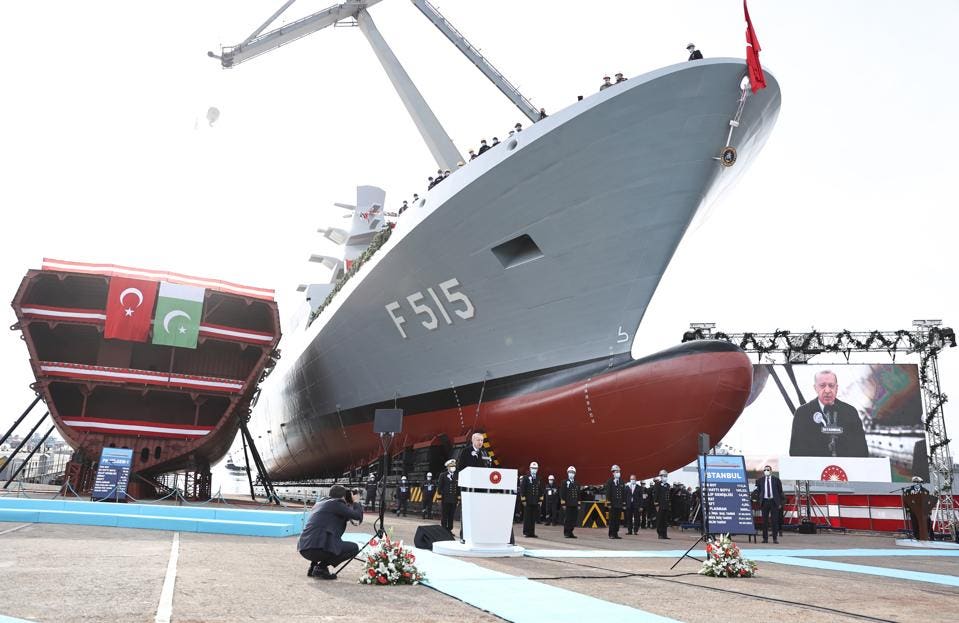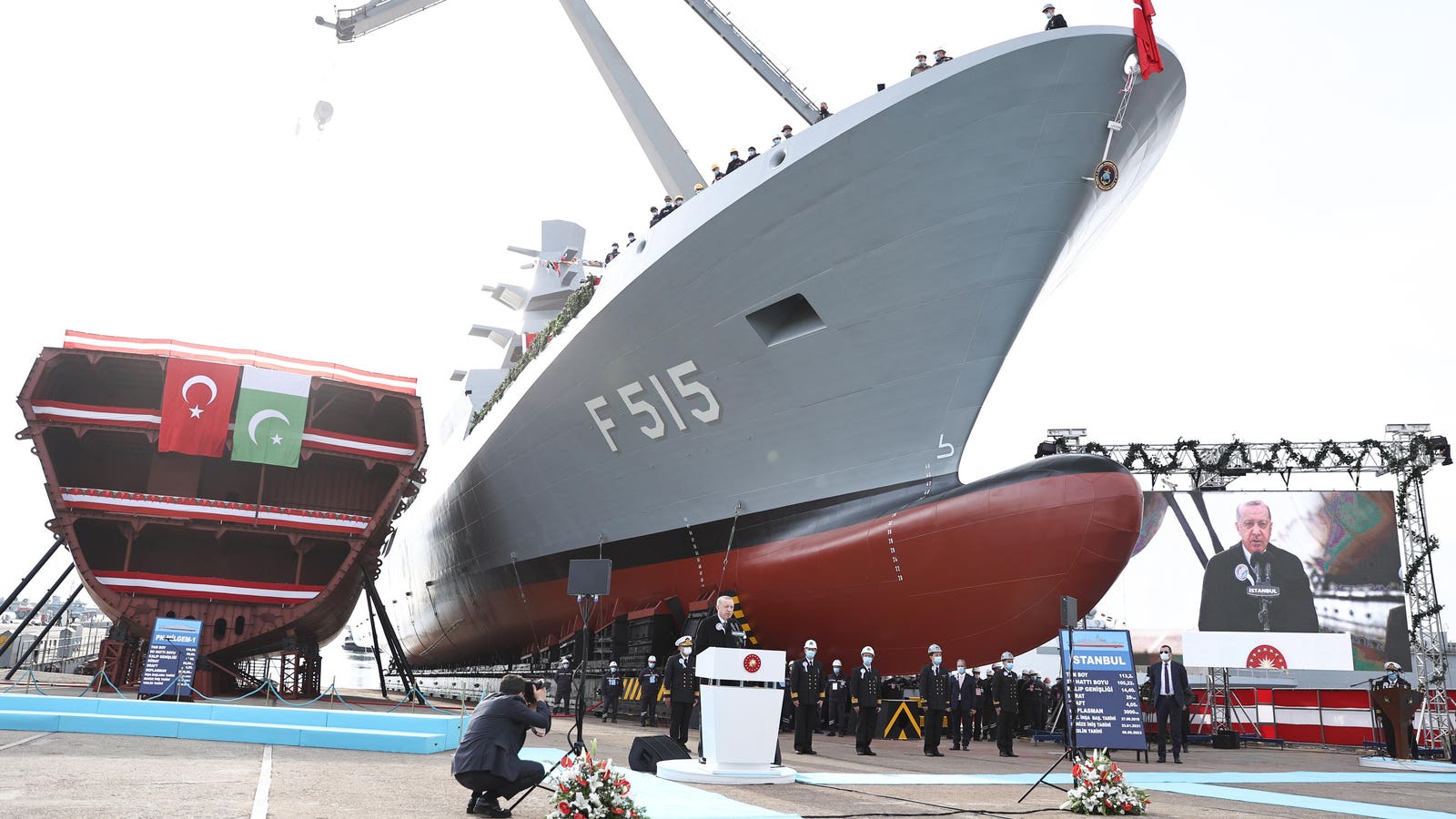dBSPL
SENIOR MEMBER

- Joined
- Mar 2, 2018
- Messages
- 7,661
- Reaction score
- 28
- Country
- Location
Jan 29, 2021,07:00am EST|
After finalizing its deal to buy Dassault Rafale multirole jet fighters from France, Greece may also seek more modern frigates. Athens will almost certainly require newer and more modern warships to counter its rival Turkey’s rapidly growing naval strength.
Greece and France signed the $2.8 billion Rafale deal this January. Greece is purchasing 18 of those 4.5-generation multirole jet fighters – six of which are brand new and 12 of which formerly served in the French Air Force – and expects to begin taking delivery of them this July.

(L-R) Hellenic National Defence Chief of Staff General Konstantinos Floros, Greek Defence Minister ... [+]
AFP VIA GETTY IMAGES
Athens also wants to buy between 18 and 24 stealthy fifth-generation F-35 Lightning II jet fighters from the United States. It is open to purchasing second-hand versions of these aircraft too, especially if that would speed up their delivery.
Lockheed Martin LMT +0.5% has begun upgrading most of Greece’s F-16 fleet to the F-16V (Block 70/72) standard in a project that will make them the most advanced in Europe. The first of a total of 84 Hellenic Air Force (HAF) F-16s being upgraded was finished on January 17. This upgrade program is scheduled for completion by the end of June 2027. The HAF’s French-built Mirage 2000-5 Mk2s are also being upgraded to extend their lifespan.
Consequently, the HAF is steadily becoming a more modern and powerful air force. The future of its Turkish rival, on the other hand, looks bleaker than ever.
Ankara was suspended from the F-35 Joint Strike Program and had its order for at least 100 of these advanced stealth fighters canceled after it purchased and took delivery of advanced Russian S-400 air defense missile systems. Furthermore, Turkey’s large fleet of F-16C/Ds, Block 30/40/50 variants, which make up the backbone of its air force, may severely suffer from a lack of extensive upgrades in the long-term.
“Most of these aircraft will have to be phased out over the next 10 to 15 years, depending on their upgrades,” noted a recent analysis on the dire state the Turkish Air Force finds itself. Recent U.S. sanctions slapped on it for its S-400 procurement, the analysis added, “means no more American helping hand for Turkey’s existing fleet of F-16s.”
Ankara can undoubtedly keep its fleet airworthy for the foreseeable future without American assistance. However, if its F-16s are not substantially modernized – or gradually replaced by more advanced fifth-generation or, at the very least, 4.5-generation fighters – it will ultimately end up with a fleet of aged and inferior fighter jets compared to those of its Greek rival.
While the HAF has a good chance of gaining a highly advantageous technological edge over its Turkish rival by the end of this decade, the Hellenic Navy (HN) could, conversely, find itself more heavily outgunned and outnumbered by the Turkish Navy than ever.
The HN presently consists of four Hydra-class frigates designed in Germany, products of the MEKO 200 frigate design, and delivered in the 1990s. It also has nine Elli-class frigates built in the Netherlands, all aside from two of which formerly served in the Royal Netherlands Navy, and delivered in the 1990s and early 2000s. Aside from this, most of the HN’s surface vessels consist of smaller gunboats. Its submersible fleet consists of 11 German-built diesel-electric attack submarines.
While this is a formidable fleet for such a small country, it’s certainly no match for Turkey’s, which is growing significantly larger and more advanced each year.
On January 23, Turkey launched its first locally-built multipurpose frigate, the TCG Istanbul, the first of four upcoming frigates of that class. The Istanbul will be delivered to the Turkish Navy in 2023.

ISTANBUL, TURKEY - JANUARY 23: Turkish President Recep Tayyip Erdogan speaks during launch ceremony ... [+]
ANADOLU AGENCY VIA GETTY IMAGES
“The I-class frigates will feature weapons systems including a locally made 16-cell MDAS vertical launching system (a total of 64 surface-to-air missiles yet to be specified); four-by-four SSM launch canisters for the Atmaca weapon; an Aselsan-made 76mm Gokdeniz close-in weapon system; two Aselsan-made 25mm machine guns; and a HIZIR torpedo countermeasures system,” reported Defense News.
The Istanbul is the latest in Turkey’s MILGEM project that builds warships domestically. Preceding the Istanbul were four Ada-class corvettes which specialize in anti-submarine warfare.
As with its rival Greece, Turkey also possesses several German-built diesel-electric attack submarines, many of them built locally under license. Turkey is presently building six new Type-214 air-independent propulsion submarines and aims to add one each year to its Navy between 2022 and 2027.
The Turkish Navy’s upcoming flagship, the TCG Anadolu, is an amphibious assault ship based on the design of the Spanish Juan Carlos I with Turkish-developed components.
Additionally, Turkey has eight ex-U.S. Navy Oliver Hazard Perry-class frigates, known in the Turkish Navy as the Gabya-class guided-missile frigates, and four Barbaros-class frigates, another MEKO 200 design.
Turkey hasn’t hesitated from showcasing its formidable naval power. In 2019, over 100 Turkish Navy ships participated in simultaneous exercises in the three seas around Turkey, the largest and most extensive exercise in that fleet’s modern history.
Turkey and Greece have longstanding maritime disputes in the East Mediterranean and the Aegean Sea that became quite tense last year. While those latest tensions appear to have simmered with the beginning of exploratory talks between the two countries, Athens is acutely aware of Turkey’s growing naval strength and increased willingness to more forcibly and aggressively stake its claims over disputed waters and natural resources.
Greece wants to buy at least four new frigates to begin building up its naval strength.
In a joint press conference in Athens this January, following the finalization of the Rafale deal, French Defense Minister Florence Parly announced that “France will soon offer to Greece proposals to renew its fleet of frigates.”
Last October, the U.S. insisted that Greece buy four U.S. frigates, three of which it said could be co-produced at the Onex Shipyards on the Greek island of Syros.
In November, the Greek press reported that the HN was interested in acquiring U.S.-built Multi-Mission Surface Combatant (MMSC) vessels. According to the report, the proposal was for “a package solution that includes the supply of four MMSC frigates, the upgrade of four MEKO-type frigates, intermediate solution ships and the participation of Greek shipyards in the development of the new American FFG(X) type frigate.”
Whatever Athens ultimately opts to do, it has become abundantly clear that its navy requires substantial procurements and upgrades to keep up the pace with its larger and increasingly more sophisticated rival to prevent the balance of naval power from shifting decisively in Ankara’s favor.
Follow me on Twitter.
Paul Iddon
I am a journalist/columnist who writes about Middle East military and political affairs.

 www.forbes.com
www.forbes.com
After finalizing its deal to buy Dassault Rafale multirole jet fighters from France, Greece may also seek more modern frigates. Athens will almost certainly require newer and more modern warships to counter its rival Turkey’s rapidly growing naval strength.
Greece and France signed the $2.8 billion Rafale deal this January. Greece is purchasing 18 of those 4.5-generation multirole jet fighters – six of which are brand new and 12 of which formerly served in the French Air Force – and expects to begin taking delivery of them this July.

(L-R) Hellenic National Defence Chief of Staff General Konstantinos Floros, Greek Defence Minister ... [+]
AFP VIA GETTY IMAGES
Athens also wants to buy between 18 and 24 stealthy fifth-generation F-35 Lightning II jet fighters from the United States. It is open to purchasing second-hand versions of these aircraft too, especially if that would speed up their delivery.
Lockheed Martin LMT +0.5% has begun upgrading most of Greece’s F-16 fleet to the F-16V (Block 70/72) standard in a project that will make them the most advanced in Europe. The first of a total of 84 Hellenic Air Force (HAF) F-16s being upgraded was finished on January 17. This upgrade program is scheduled for completion by the end of June 2027. The HAF’s French-built Mirage 2000-5 Mk2s are also being upgraded to extend their lifespan.
Consequently, the HAF is steadily becoming a more modern and powerful air force. The future of its Turkish rival, on the other hand, looks bleaker than ever.
Ankara was suspended from the F-35 Joint Strike Program and had its order for at least 100 of these advanced stealth fighters canceled after it purchased and took delivery of advanced Russian S-400 air defense missile systems. Furthermore, Turkey’s large fleet of F-16C/Ds, Block 30/40/50 variants, which make up the backbone of its air force, may severely suffer from a lack of extensive upgrades in the long-term.
“Most of these aircraft will have to be phased out over the next 10 to 15 years, depending on their upgrades,” noted a recent analysis on the dire state the Turkish Air Force finds itself. Recent U.S. sanctions slapped on it for its S-400 procurement, the analysis added, “means no more American helping hand for Turkey’s existing fleet of F-16s.”
Ankara can undoubtedly keep its fleet airworthy for the foreseeable future without American assistance. However, if its F-16s are not substantially modernized – or gradually replaced by more advanced fifth-generation or, at the very least, 4.5-generation fighters – it will ultimately end up with a fleet of aged and inferior fighter jets compared to those of its Greek rival.
While the HAF has a good chance of gaining a highly advantageous technological edge over its Turkish rival by the end of this decade, the Hellenic Navy (HN) could, conversely, find itself more heavily outgunned and outnumbered by the Turkish Navy than ever.
The HN presently consists of four Hydra-class frigates designed in Germany, products of the MEKO 200 frigate design, and delivered in the 1990s. It also has nine Elli-class frigates built in the Netherlands, all aside from two of which formerly served in the Royal Netherlands Navy, and delivered in the 1990s and early 2000s. Aside from this, most of the HN’s surface vessels consist of smaller gunboats. Its submersible fleet consists of 11 German-built diesel-electric attack submarines.
While this is a formidable fleet for such a small country, it’s certainly no match for Turkey’s, which is growing significantly larger and more advanced each year.
On January 23, Turkey launched its first locally-built multipurpose frigate, the TCG Istanbul, the first of four upcoming frigates of that class. The Istanbul will be delivered to the Turkish Navy in 2023.

ISTANBUL, TURKEY - JANUARY 23: Turkish President Recep Tayyip Erdogan speaks during launch ceremony ... [+]
ANADOLU AGENCY VIA GETTY IMAGES
“The I-class frigates will feature weapons systems including a locally made 16-cell MDAS vertical launching system (a total of 64 surface-to-air missiles yet to be specified); four-by-four SSM launch canisters for the Atmaca weapon; an Aselsan-made 76mm Gokdeniz close-in weapon system; two Aselsan-made 25mm machine guns; and a HIZIR torpedo countermeasures system,” reported Defense News.
The Istanbul is the latest in Turkey’s MILGEM project that builds warships domestically. Preceding the Istanbul were four Ada-class corvettes which specialize in anti-submarine warfare.
As with its rival Greece, Turkey also possesses several German-built diesel-electric attack submarines, many of them built locally under license. Turkey is presently building six new Type-214 air-independent propulsion submarines and aims to add one each year to its Navy between 2022 and 2027.
The Turkish Navy’s upcoming flagship, the TCG Anadolu, is an amphibious assault ship based on the design of the Spanish Juan Carlos I with Turkish-developed components.
Additionally, Turkey has eight ex-U.S. Navy Oliver Hazard Perry-class frigates, known in the Turkish Navy as the Gabya-class guided-missile frigates, and four Barbaros-class frigates, another MEKO 200 design.
Turkey hasn’t hesitated from showcasing its formidable naval power. In 2019, over 100 Turkish Navy ships participated in simultaneous exercises in the three seas around Turkey, the largest and most extensive exercise in that fleet’s modern history.
Turkey and Greece have longstanding maritime disputes in the East Mediterranean and the Aegean Sea that became quite tense last year. While those latest tensions appear to have simmered with the beginning of exploratory talks between the two countries, Athens is acutely aware of Turkey’s growing naval strength and increased willingness to more forcibly and aggressively stake its claims over disputed waters and natural resources.
Greece wants to buy at least four new frigates to begin building up its naval strength.
In a joint press conference in Athens this January, following the finalization of the Rafale deal, French Defense Minister Florence Parly announced that “France will soon offer to Greece proposals to renew its fleet of frigates.”
Last October, the U.S. insisted that Greece buy four U.S. frigates, three of which it said could be co-produced at the Onex Shipyards on the Greek island of Syros.
In November, the Greek press reported that the HN was interested in acquiring U.S.-built Multi-Mission Surface Combatant (MMSC) vessels. According to the report, the proposal was for “a package solution that includes the supply of four MMSC frigates, the upgrade of four MEKO-type frigates, intermediate solution ships and the participation of Greek shipyards in the development of the new American FFG(X) type frigate.”
Whatever Athens ultimately opts to do, it has become abundantly clear that its navy requires substantial procurements and upgrades to keep up the pace with its larger and increasingly more sophisticated rival to prevent the balance of naval power from shifting decisively in Ankara’s favor.
Follow me on Twitter.
Paul Iddon
I am a journalist/columnist who writes about Middle East military and political affairs.

Greece Will Need To Upgrade Its Navy To Keep Up With Turkey’s
Athens will almost certainly require newer and more modern warships to counter its rival Turkey’s rapidly growing naval strength.
 www.forbes.com
www.forbes.com





